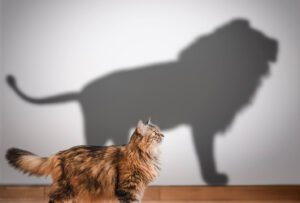Precious pups with precocious personalities, the small-statured Chihuahua is often thought of as a sassy, bold, and excitable dog. Notably, Chihuahuas are gifted with sensitivity and affection, making them a top choice for family pets. Chihuahuas are easily recognizable by their “apple” or “deer”-shaped head, triangle ears, and large eyes, but the wide variety of fur types and coat colors make them a unique and diverse breed.
Chihuahua Average Size and Life Expectancy
- Height: 6-10 inches
- Weight: 4-6 pounds
- Life Span: 12-20 years
Chihuahua Characteristics and Traits
Friendliness
Affectionate with family 4/5
Chihuahuas are known to form strong bonds within the family unit. While they may end up favoring one member in particular, you can trust that they’ll likely get along with everybody.
Good with other dogs 3/5
When socializing with other dogs, Chihuahuas can be a mixed bag. Some will enjoy spending time with fellow canines—especially other Chihuahuas—while others will prefer to be the star of the show, and may fight for attention.
Good with children 2/5
While some Chihuahuas can maintain a calm demeanor even in the face of screaming children, many will find that environment inherently stressful and may lash out in fear. Chihuahuas are best paired with children who know the limits of these sensitive dogs and can behave accordingly.
Good with strangers 3/5
Typically, Chihuahuas will want to get to know you before they’re willing to cozy up. That said, you may meet some that are easy-going from the first sniff. The Chihuahua personality can be multi-faceted and greatly ranges from one dog to another.
Adaptability
Adapts well to apartment living 5/5
It’s not just their small stature that makes Chihuahuas the perfect city dogs. They’re more than happy in smaller spaces whether it’s a one-bedroom apartment or traveling in a purse. The Chihuahua temperament is highly adaptable and well-suited to metropolitan life.
Good for novice owners 4/5
For first-time dog owners looking for a low-maintenance pup, a Chihuahua is a natural choice. They can exercise inside, take up little space, and travel well. Plus, you won’t have to worry about cleaning up massive messes when it comes to these tiny pups.
Sensitivity level 5/5
Loud and chaotic spaces can set off a Chihuahua’s natural sensitivities. These dogs require a calm setting or else they might experience puppy anxiety. While Chihuahuas enjoy some socializing and will express affection, they’d be more aligned with small soirees than raging parties.
Tolerates being alone 1/5
Where some dogs might enjoy a little alone time, Chihuahuas are always eager to see their owners. Leaving them alone for an extended period can bring unnecessary stress into their lives. Luckily, they’re the perfect pet to take on the go.
Tolerates cold weather 1/5
Because of their small size and low body fat, Chihuahuas are not built for extreme cold. If you’re looking to walk your Chihuahua through the winter streets, they’re going to need warm clothes and possibly some doggie boots. But is there anything cuter?
Tolerates hot weather 4/5
With origins in the warm climate of Mexico and a relatively thin coat of fur, Chihuahuas are fairly adaptable to the heat. However, all dogs are susceptible to heatstroke and burnt paw pads at high temperatures, so be sure to offer your Chihuahua a place to cool down in the summer and prioritize hydration.
Health and Grooming Needs
Shedding level 2/5
Chihuahuas shed year-round, with higher volumes around spring and fall, though still not nearly as much as many other breeds. Even if your Chihuahua is prone to shedding, it shouldn’t create too much of a mess in your home. The average Chihuahua weight is under 6 pounds, so the amount of shed hair is often manageable.
Coat grooming frequency 2/5
Chihuahuas should be groomed anywhere from once a week to once a month, with long-haired dogs typically requiring more frequent brushing. Add in a bath every 4 to 6 weeks and they’ll be sporting a healthy, shiny coat with little effort.
Drooling level 1/5
Chihuahuas like to open their mouths, but there’s rarely much drool to speak of. These tiny canines don’t produce excess saliva unless they’re suffering from a medical issue, so if you see some serious slobber, consider a visit to the vet.
Coat type/length 3/5
From short to shaggy, Chihuahua coats range in type and length. No matter your Chihuahua’s particular hair-do, cleaning and caring for it should be fairly simple.
General health 3/5
Chihuahuas are generally healthy pups but are also predisposed to a number of health conditions. Genetically, Chihuahuas are susceptible to various eye ailments including glaucoma. Because of their small mouths, many Chihuahuas have overcrowded teeth that can be hard to clean. Additionally, keep an eye out for tracheal collapse, liver problems, and hemophilia. That said, with proper preventative and emergency care, you can expect your pet to live a long, happy life—longer than many breeds.
Potential for weight gain 3/5
The Chihuahua’s small stature makes it easy for them to gain weight, though they may be able to quickly work off any excess calories with a long walk or extended playtime. They typically reach their full size at around 9 months old, so any sudden weight gain after this period is likely related to overfeeding or another health issue.
Size 1/5
Widely thought of as the smallest dog breed, Chihuahuas usually weigh less than 6 pounds and measure under 9 inches in height. If you’re looking for a micro-sized dog to call your own, a Chihuahua is a great match.
Trainability
Easy to train 3/5
Chihuahuas are a relatively bright breed and can therefore adapt easily to many commands, though they can also behave stubbornly. They react well to positive affirmations, treats, and regular training sessions. With some effort, you can look forward to an obedient Chihuahua who can “sit,” “stay,” and much more.
Intelligence 4/5
Don’t let their small heads fool you. Chihuahuas are highly intelligent dogs that often possess more tenacity than much larger breeds. Engage your Chihuahua with stimulating toys and play; otherwise, you may find them causing a little mischief out of sheer boredom.
Prey drive 3/5
Chihuahuas have a moderate prey drive and aren’t usually large enough to successfully hunt most animals. However, this small but mighty breed can still unleash its fiery prey drive on toys, balls, and anything smaller than them.
Tendency to Bark/Howl 4/5
Considered a particularly “yappy” breed and quite protective, Chihuahuas will readily bark at potential trespassers, due to separation anxiety, or simply out of boredom.
Wanderlust potential 2/5
Chihuahuas usually know that they have a better life with you than on their own and are unlikely to make frequent escape attempts. Most are close by their owner’s side 24/7, though some will wander out of boredom or if they feel their territory is being limited.
Physical Needs
Energy level 4/5
Many Chihuahuas will be described as hyper. Despite their high-energy personalities, their small size means they’re likely to tire out fairly quickly. With regular play and exercise, your Chihuahua should maintain an even-tempered demeanor—ready for play but not overly excitable.
Intensity 2/5
Even at maximum intensity, there’s only so much a 6-pound dog can do. Chihuahuas may not know it themselves, but they are somewhat fragile and unable to play rough compared to larger breeds.
Exercise needs 1/5
Big in spirit but small in size, Chihuahuas only need about 30 minutes of exercise per day—one 30-minute walk, two shorter ones, or some at-home or backyard play. While they require exercise like any other dog, it shouldn’t be too hard to work their needs into your daily routine.
Playfulness 4/5
Chihuahuas love to play. They’re happy to fetch, jump, and even perform the occasional trick. Just be sure that they’re treated gently and reward them with some delicious treats after extended playtimes.
Mental stimulation 4/5
These bright creatures are eager for a mental challenge. Offer your pup a food puzzle or teach them a new command to keep their mind active and anxiety levels down.
More About Chihuahuas
Hailing from the largest state in Mexico, the Chihuahua is a feisty and iconic dog regarded for its small stature and oversized personality. From celebrity owners to world-famous ad campaigns, the image of the Chihuahua is linked to its plucky demeanor and unhindered spirit. Not only is the Chihuahua a favorite among dog owners across the world, but this breed’s friendly nature also means they get along well with other dogs and cats in a shared household.
With a spunky disposition and can-do attitude, Chihuahuas are frequent companions for urban dwellers on the go. Their size means easy mobility when walking, driving, or riding around the city. Chihuahuas are usually happy anywhere as long it’s with their owner, as they form tight bonds with their primary caregiver. They can be slow to warm up to strangers but Chihuahuas display a deep intelligence behind their large eyes and can pick up new commands and tricks quickly and easily.
Despite their stature, Chihuahuas are known to stand up to dogs ten times their size, and because of their gusto, supervision is recommended when introducing your Chihuahua to new dogs. They’re excellent additions to family homes, as long as the young children know to behave calmly and respectfully around them—adult supervision is always recommended with children under 10 or so. Under the right circumstances, a Chihuahua will take their rightful place at the center of your household and your heart.
Chihuahua History
Chihuahua history dates back a millennium to the ancient Toltec civilization. Most likely an ancestor of the ancient breed the Techichi, Chihuahuas share many physical similarities with this breed. Several centuries later, in the 1800s, Chihuahuas rose to prominence in Mexico for their various skills and uses—including the ability to root out vermin and pests—and were named for the region they were first found in.
By the end of the 19th century, Americans began breeding Chihuahuas as show dogs and in 1904, the first Chihuahua was registered with the American Kennel Club. Chihuahua behavior captivated American audiences throughout the early 20th century and breeding increased until Chihuahuas became one of the most common breeds in the country.
Today, after decades of companionship and showings, Chihuahuas hold 11th place out of 155 dog breeds in the American Kennel Club rankings. While Chihuahuas are now thought of mainly as loving members of the family, those in rural areas may still rely on the Chihuahua’s ratting skills to keep their farm free of vermin.
Chihuahua Facts
- Chihuahuas have the biggest brains of any breed, relative to their body size.
- 8 out of every 10 Chihuahuas are born with soft spots on their skulls. These spots are called molera and may disappear as the dog ages, though some may remain throughout their lifetime.
- Chihuahuas, on average, live longer than almost any other dog breed. The oldest Chihuahua lived to the ripe old age of 20.
- Chihuahua litters usually contain 2 to 5 puppies.
- While they can’t necessarily guard against intruders, Chihuahuas are great alert dogs, barking at the first sign of potential dangers including fire or medical emergencies.
What You Need to Know as a Chihuahua Owner
Chihuahuas require the same loving support that all pets demand. Additionally, due to their small size, unique personalities, and particular dispositions, the standard Chihuahua profile includes several noteworthy features.
Chihuahua Health & Preventative Care
Chihuahuas, like most breeds, are genetically predisposed to certain health problems, but overall, they’re fairly healthy animals who require minimal to moderate grooming. Their small, crowded mouths make them prone to dental issues, so don’t forget to brush their teeth at home and schedule regular check-ups. Additionally, it’s important to note that Chihuahuas are more likely to be injured than to fall ill. Their fragile nature and small size mean you need to keep a close eye on your pup for potential hazards.
Recommended Health Tests From the National Breed Club:
- Cardiac Exam
- Ophthalmologist Evaluation
- Patella Evaluation
- Urinalysis
- Blood Tests
Chihuahua Temperament & Emotional Wellness
Prominent Chihuahua breed info makes it clear that these sensitive yet tenacious dogs don’t do well on their own. Without ample time with their owner, Chihuahuas may exhibit symptoms of separation anxiety. Their sensitivities can also extend to loud noises and crowds, so do your best to create a calm environment for your Chihuahua to feel at home.
Chihuahua Environmental
Originally from the Chihuahua region of Mexico, these little dogs are always eager for a return to their tropical roots—they thrive in warmer climates and aren’t well-suited to cold weather. Chihuahua’s don’t require a lot of space to be comfy. Their biggest demand is a little peace and quiet, and a lot of snuggle time with their owner.
Chihuahua Exercise & Play
Your chihuahua will likely enjoy a leisurely stroll to the local dog park, but if you don’t have time, there are plenty of opportunities to exercise at home. 30 minutes of exercise is all they really need in a day. A quick game of fetch around the living room or backyard can be enough to keep a Chihuahua fit and active, though they might also like to take the occasional trip without being packed up in a tote bag—just be careful not to overexert them.
Chihuahua Behavior & Training
Leading Chihuahua information points to this breed’s particular intelligence. Though intellect can be a double-edged sword when training your pup, Chihuahuas are highly capable of learning commands and behaving obediently, yet they’re also willful, stubborn animals with their own agendas. Reigning in your Chihuahua while providing positive reinforcement is the best method to encourage good behavior and training practices.
Chihuahua Nutrition
A simple and consistent diet of quality dog food should be the basis of your Chihuahua’s diet. You can split between ½ and 1⅓ cups of food throughout the day for your pup’s breakfast, lunch, and dinner. Besides a few simple treats, there’s no need to add anything else to your dog’s diet unless recommended by a veterinarian.
Learn How to Properly Care for Your Chihuahua & Get Nutrition Information from AskVet’s Professional Veterinarians






